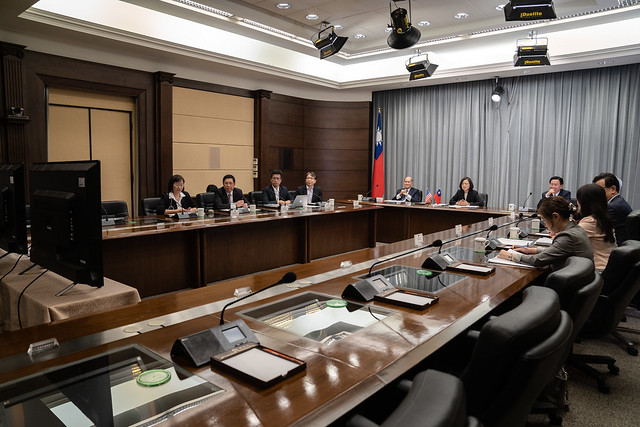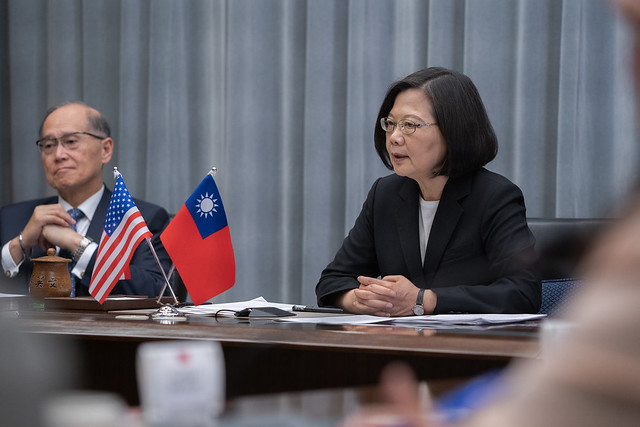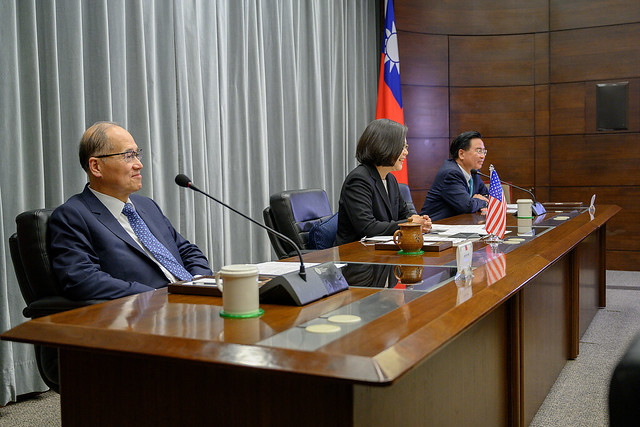News & activities
 News releases
News releases
President Tsai Ing-wen attended a videoconference from the Presidential Office with important US political figures and scholars on the evening of April 9, at the joint invitation of the Center for Strategic and International Studies (CSIS), the Brookings Institution, and the Woodrow Wilson International Center for Scholars (Wilson Center).
The videoconference was moderated by Ambassador Richard Armitage, former US Deputy Secretary of State, and hosted by Senior Vice President for Asia and Japan Chair Dr. Michael Green. After her keynote speech, President Tsai responded questions from Ambassador Armitage; Dr. Richard Bush, Brookings Institution Chen-Fu and Cecilia Yen Koo Chair in Taiwan Studies; Mr. Abraham Denmark, Director of the Asia Program at the Wilson Center; and Ms. Bonnie Glaser, Director of the China Power Project at CSIS, before giving closing remarks.
A transcript of President Tsai's keynote speech follows:
Thank you, and hello Washington, DC. Good morning from Taipei!
Rich, thank you for your kind introduction just now. It is such a privilege to address this conference, opened by Dr. [John] Hamre. I want to thank CSIS, the Brookings Institution, and the Wilson Center, as well as Bonnie, Richard, and Abe, for organising this event.
It is a pleasure to see many friends of Taiwan, including Michael Green, and Chairman Jim Moriarty, in the audience.
Here in Taipei, the clock will soon turn to April 10th. On this day 40 years ago, the Taiwan Relations Act was enacted, opening a new chapter in Taiwan-US relations.
The momentous events that led to the swift passage of the TRA forty years ago marked a difficult time in Taiwan's history. Many, both in the United States and here in Taiwan, were not optimistic about Taiwan's future – or not clear as to whether that future could remain distinct from that of across the Strait.
Few could have imagined that the foresight and friendship shown by the drafters of the TRA would eventually allow this relationship to blossom again, this time based on our shared values.
And few could have imagined that the Taiwan-US partnership would become stronger than ever, and a force for good across the world.
Enduring Partnership
With the US Congress's steadfast support, the enactment of the TRA set out the guiding principles defining how the US engages with Taiwan, and honours our past agreements. The TRA also established the American Institute in Taiwan (AIT). Today, there is no question that AIT, which is about to move into its new home in Neihu, has withstood the test of time.
By insisting on language that assures Taiwan's security, Congress made sure that Taiwan would survive its darkest hour, and have the opportunity to transform itself into the free society and robust democracy we are today.
What the TRA also reflects, is the United States' commitment to our shared interests of peace, security, and stability in the Pacific. It has supported Taiwan's development of the defence capabilities that we need, in order to resist any form of coercion.
And this commitment and support has been honoured by successive administrations and the US Congress.
It featured prominently in March 1996, when the Clinton administration sent two aircraft carriers to sail through the waters near Taiwan to stop China's attempts to disrupt Taiwan's first direct presidential election. At that historic moment, the US stood with Taiwan, showing the world its commitment to our shared democratic values.
And the people of Taiwan responded in kind, showing the world our resolve to exercise our right to vote, a fundamental democratic process, proving that we were capable of joining a global community of free and democratic nations.
So in 1996, our democracy took a big step forward. And twenty years later, Taiwan is one of the freest countries in the world, and the people of Taiwan elected their first female president.
With the benefit of hindsight from forty years of experience, I trust that everyone here today agrees that the TRA has helped create a force for good, and laid the foundations for Taiwan to become a beacon of democracy in the world.
Taiwan survived the challenges posed to us by history. We were not defeated. We are an island of resilience. And we have been working tirelessly to contribute to a brighter tomorrow for our region, and the world as well.
Today, at this conference, we commemorate the achievements of the TRA, but we should also recommit ourselves to our shared values, and common sense of purpose.
Foremost among them is ensuring that our global partnerships remain strong, particularly the special bond between Taiwan and the United States.
A Force For Good in the World
Over the past three years, we have made significant progress in advancing this relationship.
In terms of security, the TRA laid out a framework to not only "provide Taiwan with arms of a defensive character," but also "to consider any effort to determine the future of Taiwan by other than peaceful means, including by boycotts or embargoes, a threat to the peace and security of the Western Pacific area and of grave concern to the United States."
Cooperation between our two countries has continued to fulfil the spirit of these articles. Already, a steady drumbeat of arms sales has been announced by the current US administration, and we have more in the pipeline.
The US has also continued to support the development of indigenous capabilities that we are capable of building here in Taiwan. And right now, the training and cooperation between our two countries could not be closer or more robust.
But all of this only works when Taiwan is capable and determined to defend ourselves. We can't expect others to do what we are not willing to do by ourselves. So since 2016, part of my primary goals is to strengthen our defence capabilities.
Already, we have increased our defence budget over the past two years in a row. These funds will go into strategies, techniques, and capabilities that make our fighting force more nimble, agile, and survivable. These ideas are encompassed by the Overall Defence Concept, which has my support, one hundred percent.
We are making these investments not because we pursue confrontation. Quite the opposite. Our intention is to uphold the spirit of the Taiwan Relations Act, and provide for lasting peace across the Taiwan Strait. But we can't do this when we don't have the ability to deter coercion and aggression.
Our diplomats across the region are also working hand in hand to promote our shared values and interests, and push back against the growing tide of authoritarianism around the world. We know the dangers of authoritarianism too well. It is an ideology that is fundamentally at odds with freedom, and the people's right to choose.
As the TRA states: "peace and stability in the area are in the political, security, and economic interests of the United States, and are matters of international concern."
Last month, Taiwan and the United States announced the launch of the Indo-Pacific Democratic Governance Consultations, which will be a platform for us to pursue joint projects advancing good governance and human rights among like-minded countries.
We are also cooperating to advance religious freedom in the region. Last month, Taiwan and the US co-hosted a Dialogue on Securing Religious Freedom in the Indo-Pacific Region, to make a stand, as religious freedom is being threatened around the world. We want to safeguard the religious freedom of all peoples, because no one deserves to be punished or "re-educated" for his or her own faith.
The Global Cooperation Training Framework (GCTF) is another shining example of our joint work on pressing global issues. We have not only tripled the budget for this program, but we are engaging on more issues than ever before, ranging from women's empowerment to media literacy. And recently, we have welcomed the inclusion of Japan, making this truly a framework for regional partners to promote our shared values and interests.
We also want to push back against the notion that our values can – or should – be dictated by economic carrots and sticks, particularly by authoritarian governments.
So we are stepping up our work with the United States Overseas Private Investment Corporation to find opportunities to jointly invest here in the region, and across our diplomatic allies. Our engagement dates back to 1952, and an entire article in the TRA is dedicated to this relationship.
But today, we have gone from a net recipient of aid to a high-tech powerhouse. And we have the capability and expertise to work with the United States to support the economic development of our friends and partners.
All of this is taking place at a time our international space is under unprecedented challenge.
China has engaged in a relentless campaign to deny our right to participate in international affairs. They don't do this because it is a DPP administration, or because we don't recognize the 1992 consensus. They do it, because they genuinely believe that the people of Taiwan don't have an independent right to participate in global affairs.
That is troubling and destabilizing for the healthy development of cross-strait relations.
So we are grateful that the United States and other like-minded countries have continued to support us in our international endeavors.
We have seen all that the United States has done to help maintain our diplomatic alliances and counter China's influence there. And following our biannual international organization consultations, we have seen a coalition of like-minded countries gradually emerge to continuously support Taiwan's participation in UN-specialized agencies, and make sure that Taiwan's contributions can be appreciated by the international community.
Economic relations are another area where we have seen great progress since the passage of the TRA. Today, Taiwan, a country of 23 million people, is the United States' 11th largest trading partner. It's a complementary relationship, not a competitive one.
And trade has continued to increase significantly.
Our global enterprises are investing in and procuring from the United States at a rate that few people in the time of the passage of the TRA could have imagined. And vice versa, as major US technology giants, including Google, Microsoft, Amazon, and IBM expand their presence in Taiwan over the past year.
Despite these positive developments, we see potential to do more. Which is why I have made clear our intention to engage in a bilateral trade agreement with the United States.
We have the potential to work together in crafting an agreement that is based on our values and ideals, which can be used as a model for the rest of the Indo-Pacific region.
The Taiwan Relations Act envisioned a relationship in which our shared interests could be protected. And it provided a framework where one day we could defend our shared values. In today's world of increasing complexity and challenge, this has been more necessary than ever before.
One thing that we learned from the previous century, is that the forward march of democracy is not a given.
Even as we speak, forces working against freedom and democracy are becoming more active around the world. For while we measure progress in terms of freedom and individual liberty, the metrics they use are fear and control, both at home and abroad.
In fact, less than two weeks ago, China's PLA sent two fighter jets across the median line of the Taiwan Strait, breaking a tacit agreement that has served the interests of peace and stability over the past two decades.
US National Security Adviser John Bolton tweeted: "Chinese military provocations won't win any hearts or minds in Taiwan, but they will strengthen the resolve of people everywhere who value democracy. The Taiwan Relations Act and our commitment are clear."
We could not agree more.
Given the traditional and non-traditional challenges facing us today, the need for a collective response has never been clearer. And Taiwan is ready, willing, and able to do our part to achieve our shared vision.
My Commitment: A Reliable Partner
So on the 40th anniversary of the Taiwan Relations Act, we must be willing to work harder to ensure that the people of Taiwan can continue to live free from fear, and coercion for their belief in democracy.
The TRA drafters began their work 40 years ago. But their work remains unfinished. Their vision will only be fully achieved when our region becomes free, open, and democratic.
Taiwan is not just a recipient of this. We are a partner in this.
At this critical moment, it is more important than ever to ensure that the letter and spirit of the TRA prevail, and that the values we share continue to shape the future of our region.
Even though I am not in Washington DC with you all, our shared vision has made our two countries feel closer than ever before.
And together, with your support, we will continue to remind the world that Taiwan is an irreplaceable force for good in the world.
Thank you.
Attendees included National Security Council Secretary-General David T. Lee (李大維) and Foreign Minister Joseph Wu (吳釗燮).











